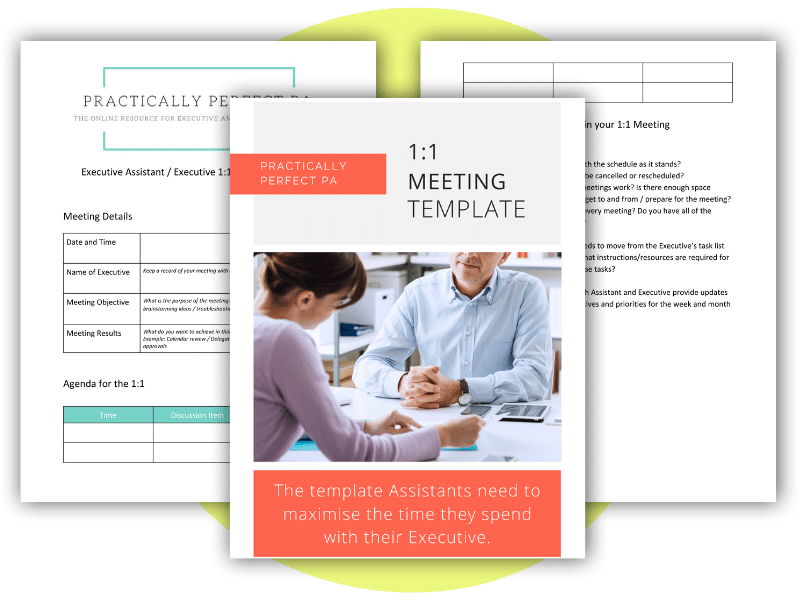Scheduling time for a successful Executive-Assistant relationship
An effective relationship between an Executive and their Assistant is critical to the success of any organisation. You must work in sync and regularly communicate to ensure you are on the same page. But how do you find time in the schedule for regular face-to-face meetings? It cannot be easy when you are both so busy.
As an Assistant, your days are filled with tasks that demand all of your attention, and it can be challenging to find the time to connect with your Executive regularly. If you also have a busy Executive who is often in meetings or on business trips scheduling time for a successful Executive-Assistant relationship can be even more difficult.
This article will explore how scheduling time for a successful Executive-Assistant relationship can help you create extra time for meaningful conversations with your Executive. And if you’re feeling overwhelmed or stuck, go ahead and take a deep breath – by the end of this article, you’ll have some strategies that prioritise connecting with Executives so that both focused collaboration and quality conversations are possible.
The benefits of face-to-face meetings with your Executive
Scheduling time for a successful Executive-Assistant relationship and having regular face-to-face meetings with your Executive are essential to maintaining an effective relationship. It provides an opportunity for both of you to discuss upcoming projects, address any issues that have arisen, and assess progress made on current tasks. It also serves as a platform for better communication, allowing both of you to express yourselves more clearly than through emails or phone calls. Additionally, having face-to-face meetings can help build trust between you as the Assistant and your Executive, leading to increased productivity and greater collaboration.
Gaining control of the schedule
Executives need to grant their Assistants access to their calendars so they can easily schedule face-to-face meetings with them. This will help ensure that there is always time for these meetings, that they take place and are prioritised over other meetings and activities. Assistants need to understand their Executive’s priorities, goals and objectives well. They will then know what is essential and what needs to go into the schedule. With this knowledge, Assistants can slot in the best time for them to speak with their Executive and help move those priorities forward.
Make a plan to connect with your Executive regularly
Set up a weekly check-in meeting with your Executive to discuss upcoming tasks and deadlines. If you struggle to meet as often as you want, submit reports about the tasks and projects you are working on throughout the month that provide insight into your progress – this will help prove your value as an Assistant. Taking the initiative in forming and maintaining regular communication with your Executives is paramount for success in the role.
Making it work together
No matter how busy your Executive’s schedule may be, scheduling time for a successful Executive-Assistant relationship is crucial. Doing so will help build trust between both parties and create a stronger working relationship. It will also allow you to collaborate more effectively, resulting in better productivity from everyone involved. Ultimately, granting you access to their daily calendar will give you the freedom to take control of meeting agendas and ensure that there is always time scheduled for regular face-to-face meetings.
Be prepared for meaningful conversations and know what you want to discuss.
Assistants should always come prepared for important conversations with their Executives. Preparation will not only ensure that the Executive is kept informed about every necessary detail and update, but it will also help you to address potential issues coming down the road. This includes clearly understanding the topics that need to be discussed, anticipating any questions that may arise, and rehearsing responses with confidence. Being well-prepared before meetings or conversations with your Executives will demonstrate your commitment and ability to meet your Executive’s needs and expectations.
Respect their time and yours – don’t waste either of your time by being unprepared or unprofessional.
As an Assistant, you must respect both your Executive’s time and your own. Showing up unprofessional or unprepared for any meeting or discussion can not only put a damper on the situation but can also leave an unintentional negative impression of yourself. To maximise productivity and foster a sense of respect between Executive and Personal Assistant, it is imperative to be prepared by having all paperwork in order and relevant information ready at hand. Furthermore, engaging in conversation and confidently voicing your opinion will help your Executive to see firstly the importance of the meeting and you as a valuable resource they can rely on going forward.
Preparing for meetings beforehand ensures there are no surprises or miscommunications that could quickly turn an otherwise smooth interaction into a waste of time. To truly honour the Executive/Assistant relationship, ensure everyone’s valuable time is treated equally.
Establishing a successful working relationship between you and your Executive requires collaboration and communication, which are best achieved through regular face-to-face meetings. Making sure there is time in the schedule for these sorts of meetings should be a priority; having access to your Executive’s schedule means that this happens without too much hassle, and you can control when you have that face-to-face communication.





